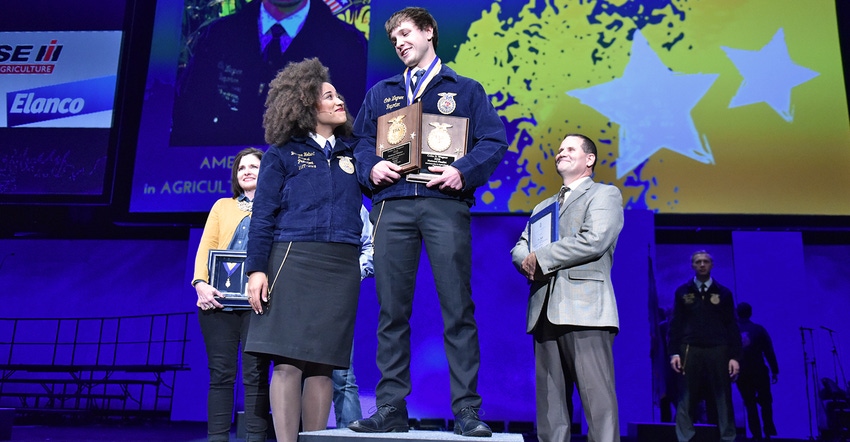
Working on his family’s Wells, Minn., farm was a big motivator for Colin Wegner when he decided to pursue a career in agriculture.
In high school, his FFA advisor encouraged him to take advantage of the opportunity to be involved, so he did. He started in ninth grade, completing smaller tasks on the farm before moving up to operating equipment as he learned to drive. He worked on his FFA supervised agricultural experience throughout high school and college at Wegner Farms, raising corn and soybeans.
Now as a graduate of South Dakota State University with an agronomy degree, this fifth-generation farmer works full time on the farm and is active in making day-to-day business decisions.
“I’ve learned so many skills and life lessons in working with my family, seeing how they do things and learning from them,” Wegner says. “I really just cultivated a passion for agriculture.”
Wegner’s efforts at integrating into the family operation helped earn him the 2018 National Star in Agricultural Placement at the 91st National FFA Convention & Expo in late October in Indianapolis. His parents are Eric and Shannon Wegner.
Internship led to college major choice
His FFA and college experiences helped him develop an overall appreciation for agriculture. While in high school, he participated in the agribusiness and soil judging career development events and learned record-keeping skills. He became interested in the agronomy side of production ag towards the end of high school.
“I knew I wanted to go to college for something agriculture-related, but didn't exactly know until then,” he says. “After my first year of college, I had an internship in the summer of 2016 with Nielsen Agronomics Inc.” The ag service company, started by Dan Nielsen and based in Rose Creek, Minn., offers crop scouting, crop planning and soil testing services.
“In my summer working with Dan, I learned a tremendous amount of agronomic knowledge,” Wegner says. “I did crop scouting all summer and some soil sampling. It gave me the opportunity to see how Dan puts together crop plans for a growing season.” The experience solidified his decision for a college major. In May 2018, he graduated from South Dakota State University with a bachelor of science degree in agronomy.
The Wegner family operates three farm business enterprises: the family farm, raising 3,000 acres of corn and 2,000 acres of soybeans; Wegner Seeds, working as a Dekalb Asgrow seed dealer; and a trucking business, Wegner Trucking.
Along with his parents, Wegner also works on the farm with his grandfather Mike and his grandfather’s brother Ron, and Ron’s two children, Britt and Blair. Everyone is capable of operating all of the farm equipment, yet depending on the season, some job responsibilities fall to certain people. For example, Mike operates a specific planter and combine, and Ron runs the sprayer and tillage equipment.
Although the family no longer raises dairy heifers, the Wegners still harvest hay from field waterways and local road ditches, making about 800 round bales every summer. Most hay is sold to local dairy producers.
Future goals
Looking forward, Wegner already has ideas and goals for his family’s farm, one of which is to average 300 bushels of corn per acre within the decade. The Wegners are looking at several ways to bump up yields, such as tweaking their nitrogen management plan, using variable-rate fertilizer technology and analyzing satellite maps to determine what might be going on in certain fields.
“We switched from a split nitrogen application in the fall and early-growing season to a fall application and a late-season application of nitrogen via Y-drop,” Wegner says. “We have seen the benefits of this the past couple of years.”
His cousin Blair made the family’s Y-drops, which attach to a Hagie sprayer. They apply either 28% or 32% N in liquid UAN form between V8 and V11.
“The liquid product goes through the Y-drops and is placed right next to the stalk of the plant,” he says. “Since this nitrogen product can leach through the soil profile easily, placing it directly on top of the root system heavily increases the chances of the plant using it.”
The Wegners continue to fine-tune fertilizer use by relying 100% on variable-rate technology.
“On ground that has consistently performed, we are investing more nutrients into that area. On ground that just hasn’t been able to produce, we cut back on inputs,” Wegner says.
They also use variable-rate technology to determine seeding populations in correlation with production zones and soil types, and analyze overall field data with Climate FieldView, a data collection software platform.
Adds Wegner: “One of the things I enjoy most about farming is being able to see all of the inputs put into the soil during the growing season come to fruition during harvest. We take good care of our crops and do everything in our control to ensure that each plant will reach its full potential. It is rewarding when it pays off. Being able to do this with my family is really special.”
About the Author(s)
You May Also Like






